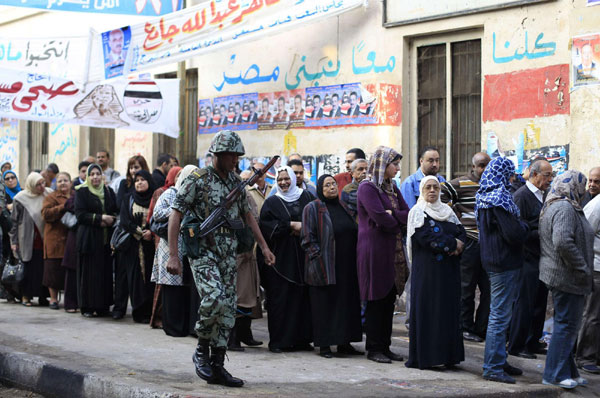Egypt takes key step forward in democratic transition
 0 Comment(s)
0 Comment(s) Print
Print E-mail
Xinhua, December 1, 2011
E-mail
Xinhua, December 1, 2011
Calmly and enthusiastically, Egyptians have finished the first stage of the People's Assembly vote, a positive step in the country's democratic transition process after the fall of ex-president Hosni Mubarak in February.
 |
|
An Egyptian soldier guards as Egyptians wait to cast their votes during parliamentary elections, outside a polling station in Cairo November 28, 2011. [Photo/Agencies] |
A high turnout estimated at 70 percent, judicial monitoring and little violence, make Egyptians feel they have really enjoyed a free and fair vote for the first time in decades, as the previous elections during the former regime were often accused of fraudulence and corruption.
Wednesday's major Egyptian newspapers described the historical vote as a successful democracy test and the birth of new Egypt. The vote also won acclaims from international community. UN Secretary-General Ban Ki-moon on Tuesday hailed the polls as an important step towards the establishment of civilian rule.
The vote was held under complicated situation in Egypt. Just ten days prior to the polls, mass protests erupted and fatal clashes followed in Cairo and some other cities, pressing Prime Minister Essam Sharaf's cabinet to resign on Nov. 20. Some political forces called for a delay of the vote.
However, all the positive aspects of the voting on Monday and Tuesday indicate that Egypt has taken a positive step on its transitional road, which has witnessed frequent protests, sporadic serious violence and an economic slowdown in the past ten months due to the instable and uncertain circumstances.
The peaceful electoral process, sort of unexpected, pushed Egypt's major stocks index EGX30 up 5.48 percent on Tuesday. The social unrest has dealt a blow to the country's economy, with a sharp fall of investment and tourist arrivals, two key drivers of its economic growth.
The People's Assembly, the major legislature to be elected after the three-stage vote ends in early January, will be in charge of selecting a committee to draft the new constitution. A referendum will be held for the constitution and presidential elections follow.
With the dissolution of the former ruling National Democratic Party in April and the amendments of the party law, political parties have sprung up in Egypt. Twenty-six new parties have been founded since February, raising the total number of parties in Egypt to 50.
Islamic forces, represented by the Muslim Brotherhood and Salafists, established many parties to compete for future power and are expected by analysts to win up to 40 percent of the total of 498 seats up for grabs. Secular parties and groups also formed coalitions to confront the Islamic movements.
The diversification of participants makes it difficult for any single party to win the majority of the seats. A fragmentation of political forces in the parliament casts shadows on its performance, especially on whether it could have harmonious cooperation with the ruling military council before the latter fully cedes power.
Undoubtedly, the initial success will restore certain confidence in the Supreme Council of the Armed Forces, who has ruled Egypt since Mubarak's fall. Youth groups, unsatisfied with the military rule, have been urging a quick transfer of power, though the military has made concessions and declared that presidential polls will take place before June 30, 2012, about half a year earlier than the previous schedule.
As the vote was held, some young protestors continued their sit- in in Cairo's Tahrir Square. On Tuesday night, dozens were injured in gunfire and fighting between protestors and vendors in the square. Meanwhile, some political groups are reportedly calling for another million-man protest on Friday.
Given the current fragile social stability and uncertainties about future power sharing, Egyptians still have a long way to go on their road to a democratic country. The key Middle East country's political landscape will also have an impact to the whole region.





